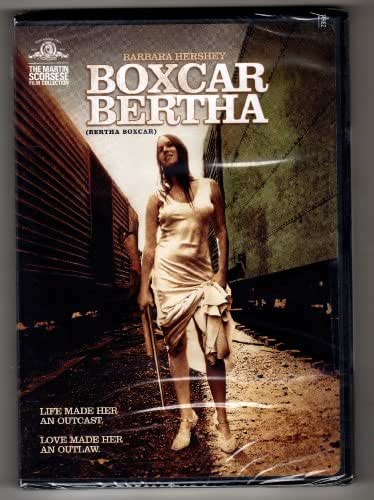**½/**** Image A- Sound B+
starring Barbara Hershey, David Carradine, Barry Primus, Bernie Casey
screenplay by Joyce H. Corrington & John William Corrington, based on Sisters of the Road by Bertha Thompson, as told to Ben L. Reitman
directed by Martin Scorsese
by Bill Chambers Although a Martin Scorsese retrospective could easily survive the absence of Boxcar Bertha, the film is a cornerstone of the director's filmography: Without it, there is conceivably no The Last Temptation of Christ–Bertha herself, Barbara Hershey, introduced Scorsese to the Nikos Kazantzakis source novel during production–and no Mean Streets. Because he'd been toiling away on the Hollywood fringe after getting fired from his would-be sophomore effort, 1970's The Honeymoon Killers, for shooting everything in master (an experiment he would repeat to great acclaim with The King of Comedy), Scorsese agreed to helm AIP's umpteenth Bonnie and Clyde wannabe, an in-name-only sequel to the drive-in sensation Bloody Mama (which incidentally starred his future muse, Robert De Niro). "You just spent a year of your life making a piece of shit," went John Cassavetes's immortal response to the results, a critique not so much of the work itself as of Scorsese's decision to play the hired gun. Thus aborted his mission to position himself as one of the California film brats conquering the industry, as Cassavetes's tough-love approach spurred him to return to New York and resurrect the idea for Season of the Witch, a thematic follow-up to Who's That Knocking At My Door that eventually became Mean Streets.
|
Granted an extraordinary amount of latitude by producer Roger Corman so long as every reel started off with some nudity, Scorsese clearly regarded Boxcar Bertha as a goof, renaming a couple of bit parts Powell & Pressburger, indulging both the grindhouse and serial-oater sensibilities between which the movie vacillates in two distinct sets of opening titles, and deploying dolly tracks like a kid in a candy store–which, of course, he was. A prologue featuring a biplane crash reveals a precedent for those visceral flying sequences in The Aviator, while a montage in which Bertha's lover Bill (David Carradine, ironically) is nailed to the side of a boxcar is shot-for-shot the crucifixion of Jesus in The Last Temptation of Christ. (I don't think Scorsese was harking back to Boxcar Bertha there so much as a version of the passion play had long ago crystallized in his mind–right around the time that film overtook religion as his central preoccupation.) And then you have the regional updating of a key character to give Scorsese a point of identification, although most of the cast exudes such worldliness that it scarcely means anything to have somebody (Barry Primus) formally essaying a Yankee interloper.
Boxcar Bertha is not just a fun Easter egg hunt, either–it's salvaged by movie-love. Even if Boxcar Bertha adds weight to his argument, I can't abide Jonathan Rosenbaum's recent contention that Scorsese is at the mercy of the screenplay, for while Rosenbaum writes that the same holds true of Clint Eastwood, Scorsese's aesthetic at least cushions the blow of a bad script where Eastwood's austerity leaves the nerve endings of lousy material dangerously exposed. (You can't tell me that Scorsese has ever been responsible for something as dreadful as Blood Work, whose screenplay is arguably better than Boxcar Bertha's.) With Boxcar Bertha, Scorsese is more accurately at the mercy of his inexperience, though he is indeed saddled with a shoddy adaptation of Sisters of the Road–fabulist Ben Reitman's autobiography of the titular hobo/agitator, which fooled generations of readers until its most recent publisher tacked on an afterword confessing to the hoax–by the perpetrators of The Omega Man, who never met a deus ex machina they didn't like. Lucky for Scorsese, however, they're obsessed with martyr imagery, and their penchant for the arbitrary, means-to-an-end alliance allows him to rehearse for the unlikely pairings that will become a hallmark of his work.
THE DVD
MGM reissues Boxcar Bertha on DVD with tie-in cover art commemorating its rightful place in "The Martin Scorsese Film Collection." Presented in mildly windowboxed 1.82:1 anamorphic widescreen and transferred from a healthy and diligently-cleaned source print, the picture has new vibrancy unearthed by the format; Hershey simply did not look this fetching in previous editions. The accompanying Dolby 2.0 mono audio isn't nearly as impressive as the video until you watch the dilapidated theatrical trailer with sound quality reminiscent of a drive-thru operator taking your order.





